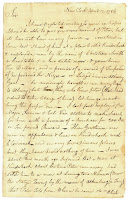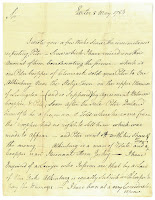 On June 13, 1782, James Blanchard, who had served in the 3rd New Hampshire Regiment as quartermaster and paymaster from 1776-1781, wrote to Josiah Bartlett, then a member of the New Hampshire State Supreme Court. In the letter Blanchard replies to Bartlett's request to have one of his slaves conscripted into the revolutionary forces: “in your instructions to me you empowered me to enlist him in the New Hampshire Line.”
On June 13, 1782, James Blanchard, who had served in the 3rd New Hampshire Regiment as quartermaster and paymaster from 1776-1781, wrote to Josiah Bartlett, then a member of the New Hampshire State Supreme Court. In the letter Blanchard replies to Bartlett's request to have one of his slaves conscripted into the revolutionary forces: “in your instructions to me you empowered me to enlist him in the New Hampshire Line.”The enlistment of slaves during the Revolutionary War was not unusual. New Hampshire enacted a law in the fall of 1777 that allowed owners to enlist their slaves as substitutes for themselves or their relatives or in return for their enlistment bounty. However, by the end of 1777, Congress, in an attempt to appease southern slave owners, discouraged this practice. On the loyalist side, Lord Dunsmore, the royal governor of Virginia had enacted a law in April 1775, that promised slaves owned by rebels their freedom if they fought on the side of the British.
Blanchard was not happy about Bartlett’s request “of doing a thing that I had always reprobated others for.” Instead he tells Bartlett that he should sell him because Blanchard believed the slave “had a propensity for stealing.” Throughout the letter, the name of the slave is not revealed. However, in a postscript he is referred to as Peter, which is interesting because two years later there are two additional letters from Blanchard to Bartlett regarding the escape of a slave named Peter. In those insistences, Blanchard, tasked by Bartlett to recover said Peter, relays a saga that involves Peter being illegally sold by some shadowy characters to a man “at Livingston Manor … by the name of Alkenburg (a Tory),” and then declaring himself a free man. Blanchard informs Bartlett that during the course of his investigation, he had a “very considerable expense in employing men to look for the black dog,” and that he plans to sue the Tory and the other men involved, one of whom he calls “an itinerant horse Jockey.”
Unfortunately, we may never know what happened to Peter, but Blanchard became an advocate for veterans, serving as agent for several veterans pursuing claims against Congress. Josiah Bartlett, who was a signer of the Declaration of Independence, became the 4th Governor of the State of New Hampshire.
Blanchard's letters to Bartlett are contained in a small but rich collection of letters that are part of MS- 181, the Josiah Bartlett papers. Other correspondents include Bartlett’s co-signer of the Declaration of Independence William Whipple, as well as John Langdon and Nathanial Peabody.


No comments:
Post a Comment